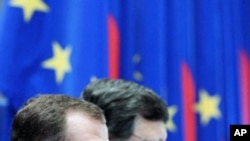Russia says it will lift its ban on European Union vegetables imposed in the wake of the deadly E. coli outbreak.
Russian President Dmitry Medvedev and EU Commission chief Jose Manuel Barroso made the joint announcement Friday following a two-day Russia-EU summit in the central Russian city of Nizhny Novgorod.
The EU is to provide Moscow with documents certifying the vegetables' safety.
German public health officials say new data show that contaminated sprouts are the source of the outbreak, which has killed at least 30 people and sickened nearly 3,000 others. All but one of the deaths and the majority of those infected have been in Germany.
The head of Germany's national disease control center said Friday the pattern of the outbreak points to the sprouts as the source.
Health officials initially blamed the bacterial infection on Spanish cucumbers and other vegetables and then spread the blame to other European countries, costing EU farmers millions of dollars as produce was left to rot in fields and warehouses. Russia is one of the EU's largest markets for vegetables and other produce.
German authorities are now lifting the warning against eating cucumbers, tomatoes and lettuce, but they say the crisis is not over and people should not eat bean sprouts.
Russian officials gave no specific timeframe for resuming vegetable imports from the European Union, saying it depends on how quickly the EU sends the documents. The EU has promised to send the safety certificates in the next two days.
E. coli symptoms include stomach cramps, diarrhea, fever, vomiting, and in extreme cases, kidney failure and death.
Some information for this report was provided by AP, AFP and Reuters.




